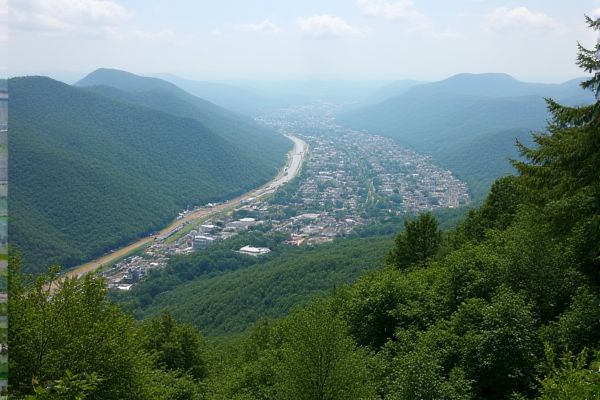
Transportation and commuting in West Virginia: WV Public Transit system availability. Major highways: I-64, I-77, I-79. Martinsburg Amtrak and rail services. Appalachian Regional Port freight services. Morgantown Personal Rapid Transit (PRT) system. Charleston Yeager Airport for air travel. Rural road conditions and maintenance. Carpooling and vanpooling programs. Gasoline prices and fuel stations. Bicycle and walking trail networks.
WV Public Transit system availability
The West Virginia public transit system, represented by agencies like the Mountain Transit Authority (MTA) and the Eastern Panhandle Transit Authority (EPTA), provides extensive services including fixed routes, deviated fixed routes, demand response, and non-emergency medical transportation across various counties, ensuring accessible and reliable transportation for the public. You can find more information about these services by visiting the Mountain Transit Authority website, which serves as a vital resource for those needing transportation solutions in the region.
Major highways: I-64, I-77, I-79
In West Virginia, major highways play a crucial role in connecting important cities and facilitating travel across the state. One of the primary routes is I-64, which spans 189 miles east-west, passing through cities such as Huntington, Charleston, and Beckley. Additionally, I-77, a significant north-south route, includes the West Virginia Turnpike and serves communities like Charleston and Parkersburg. This 187.21-mile stretch is vital for commerce and daily commutes. Another key highway is I-79, which runs 160.52 miles northward from Charleston to the Pennsylvania border. This expressway serves several counties and makes a crucial connection with I-68 near Morgantown. For more detailed information, the West Virginia's Major Highways page on the West Virginia Encyclopedia offers comprehensive insights about the state’s transportation network.
Martinsburg Amtrak and rail services
Martinsburg Station in West Virginia is served by MARC Brunswick Line commuter rail and Amtrak's long-distance services, including the Capitol Limited and Cardinal routes. The station, a restored 1848-1876 railroad hotel, is a historic landmark and a key transportation hub in the region, although it is not compliant with the Americans with Disabilities Act of 1990. For more detailed information, you can visit the Wikipedia page dedicated to Martinsburg Station.
Appalachian Regional Port freight services
The Central Appalachia Inland Port at Prichard in West Virginia, leased by R. J. Corman Switching Company, LLC, is a 65-acre facility that efficiently transfers shipping containers between railcars and trucks. This port, strategically served by Norfolk Southern Railway's Kenova District, is on the cusp of expanding its services to include car repair and other capabilities, aiming to significantly boost the regional economic impact. For more details on these developments, you can visit the R. J. Corman website. This initiative marks a pivotal moment for enhancing logistics and economic growth in the region.
Morgantown Personal Rapid Transit (PRT) system
The Morgantown Personal Rapid Transit (PRT) system, operated by West Virginia University, is a reliable and efficient automated transit system connecting the university's campuses and the city's downtown area. It features 73 vehicles, five stations, and a 3.6-mile route, operating dynamically to rider requests with high on-time service rates and low operational costs. For further details on this innovative transit solution, you can explore more on the Morgantown Personal Rapid Transit system's Wikipedia page. This transportation marvel serves as a model of modern urban transit solutions.
Charleston Yeager Airport for air travel
West Virginia International Yeager Airport (CRW) in Charleston offers convenient air travel with services from major airlines, nonstop flights to key hubs, modern terminal amenities, and easy ground transportation options including car rentals, taxis, and ride-sharing services. This makes it a central transportation hub for the region. For more detailed information, you can visit the official website highlighting its pivotal role in regional connectivity and accessibility.
Rural road conditions and maintenance
Rural roads in West Virginia are often in poor condition, with many being 'unadopted' and receiving no maintenance such as salting or snow removal, leading to hazards like potholes, crumbling asphalt, and road slips. Additionally, these roads lack adequate safety features and have a high fatality rate due to narrow lanes, sharp curves, and limited clear zones. To learn more about how to navigate these challenges safely, you can visit the Bell Law website for detailed guidance and advice on driving in these areas. Understanding these issues is crucial for ensuring safety while traveling through West Virginia's rural landscapes.
Carpooling and vanpooling programs
Carpooling and vanpooling programs typically involve free ridematching services, coordination of car and van pools, and often include Guaranteed Ride Home programs for emergency situations. These programs aim to reduce traffic congestion and increase mobility by matching commuters with similar routes and schedules. For more detailed information on such initiatives, the Rideshare Info website serves as a valuable resource for understanding how these programs function and their benefits to communities.
Gasoline prices and fuel stations
In West Virginia, as of December 8, 2024, drivers are encountering differing gasoline prices depending on their location within the state. The average cost is $2.945 for regular, $3.355 for mid-grade, $3.811 for premium, and $3.547 for diesel fuel. These figures can vary significantly across different counties and metro areas, reflecting the diverse economic and logistical factors that influence fuel costs. To gain a deeper understanding of these variations, the AAA Gas Prices website offers a comprehensive breakdown of gasoline prices across the region, providing valuable insights for consumers and businesses alike.
Bicycle and walking trail networks
West Virginia boasts an extensive network of bicycle and walking trails, which includes over 5,000 miles of trails categorized as long distance, recreational, interpretive educational, historical, and rail trails. The state actively promotes cycling infrastructure by designating routes like US Bike Routes, including USBR 50, and adopting Complete Streets concepts to bolster safety and connectivity for non-motorized users. For more detailed information, you can visit the West Virginia Department of Transportation's website.
